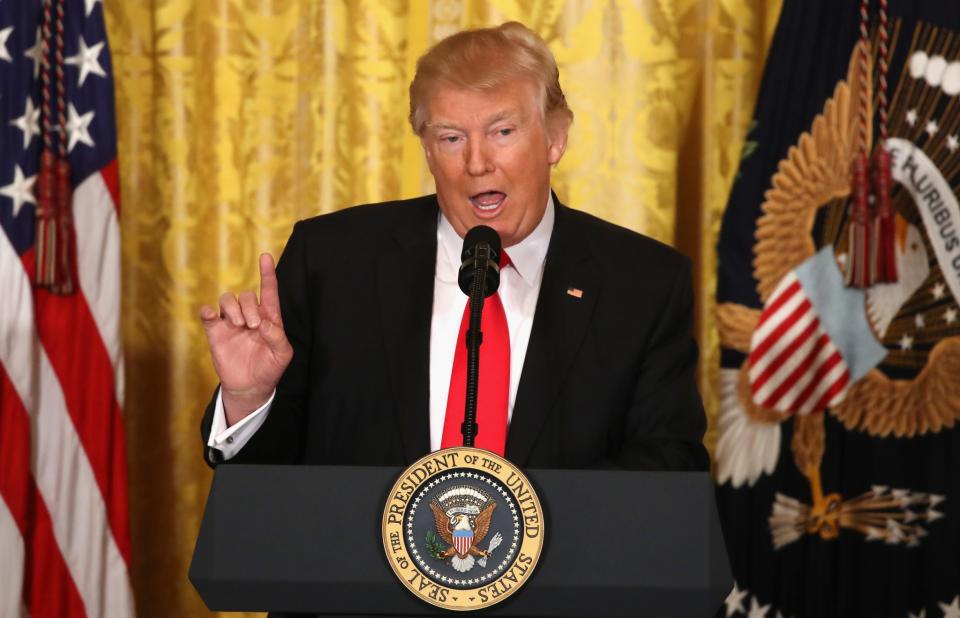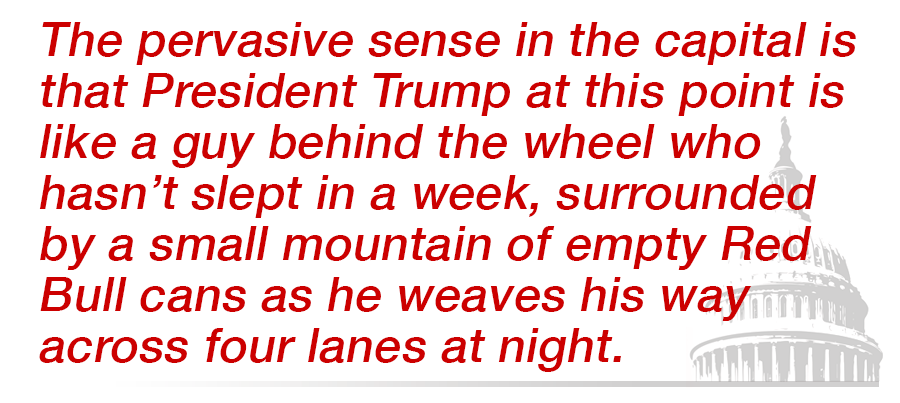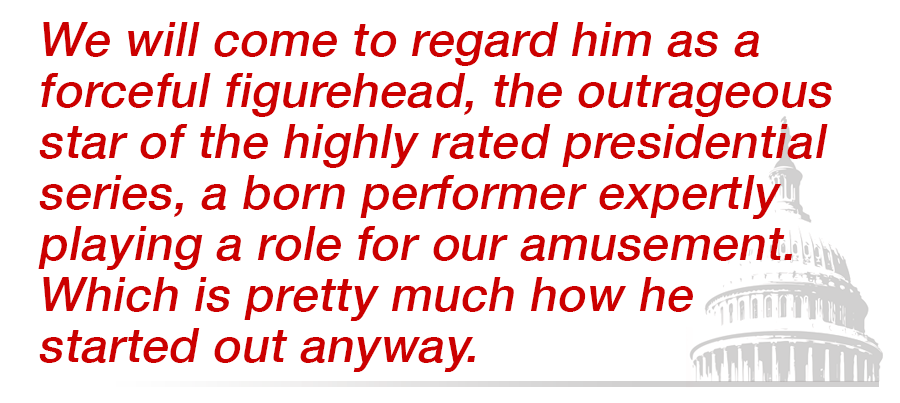Where does the Trump saga end?

Where is all this headed, and how does it end?
These are the questions you hear all over Washington right now. Which is strange, because normally you wouldn’t be idly speculating about the end of a presidency barely a month after the inauguration. Certainly, in parts of the country that voted overwhelmingly for Trump, the sense is he’s just getting started.
But the pervasive view in the capital is that President Trump at this point is like a guy behind the wheel who hasn’t slept in a week, surrounded by a small mountain of empty Red Bull cans as he weaves his way across four lanes at night, squinting to read the signs and ignoring the angry blasts of horns.
Sure, it’s a straight drive home on a sparsely populated highway. But at this rate, what are the odds he makes it very far without hurting himself … or someone else?
Some of this is just the lingering shock of the election. A lot of people in Washington are still waking up every morning with a feeling of “this cannot be happening,” and from there it’s a short jump to “this cannot go on for very long.”
But it’s also the sense that Trump himself has skipped right over the opening and middle stages of a normal presidency — honeymoon, legislative push, midterms and reelection — and leaped straight into the self-pitying, paranoid, scandal-shadowed slog of year seven.

Already he spends half his time golfing in Florida and the other half watching cable TV. While hostile nations brazenly test the boundaries of this new United States of Entropy, the president labels the media “the enemy of the American people,” as if he’s planning to storm the network studios and replace their programming with endless “Apprentice” reruns.
If all of this doesn’t frighten some wide swath of voters, then it’s bound to exhaust them. So it’s reasonable to ponder the fate of the Trump presidency, just weeks into the grand experiment.
Trump could get his act together any day now, dedicate himself to learning the job. If this were a movie, he might have this moment of epiphany at a soup kitchen somewhere when he realizes the nation is depending on him to be a bigger man, and we’d instantly time-cut to three days later, when he’s pored through a raft of presidential biographies and decided to fire his entire staff and start again.
Then again, if this were a movie, it might also be called “The Siberian President,” and it might end with Trump trying to hold off Ben Affleck and a unit of elite Rangers with an AK-47 on the steps of the Lincoln Memorial, shouting epithets in Russian. Either seems equally plausible to me.
Democrats have their own wishful scenario, which involves impeachment. But absent some cataclysmic revelation (like, say, that Trump agreed to hand over all of Ukraine to the Russians in exchange for turning the Kremlin into the most incredible, most elegant five-star resort you’ve ever seen in your life, you wouldn’t believe), it’s hard to imagine a Republican Congress evicting a president who remains a folk hero to its base.
You can more easily see how Trump might talk his administration into total paralysis. If he decides to stay on the current erratic trajectory, and if his approval ratings keep sinking in search of a bottom, a lot of governing Republicans will run from him as fast as they can, and he’ll find himself isolated and unable to achieve much of anything.
Down that path lies an almost certain primary opponent — probably a Marco Rubio or a John Kasich — and the very real possibility that Trump would walk away voluntarily, in order to at least give Mike Pence a fighting chance to succeed him.
Leaving all these possible outcomes aside for the moment, though, the one that seems most likely to me is probably also the most mundane. The presidency isn’t going to change who Trump is, but he may very well end up changing the way we think about the presidency.
Eventually, and not so very far into the future, two things are going to happen. The first is that Trump is going to realize that a White House can’t really run this way — the president at war with the media, aides at war with each other, fictions at war with facts. Someone needs to get control of the operation, and hopefully before an economic or international crisis comes along to make the dysfunction even clearer than it is.

The second is that Trump is going to decide he actually doesn’t like the job very much — or at least not the part of the job that’s all about policy and vote counts and other things you have to think about for more than 90 seconds without changing the subject to yourself.
And that’s the moment when Trump, who knows nothing if not how to bail out failing business ventures, will bow to the protestations of establishment Republicans and retool his administration. He’ll bring in a chief of staff who knows something about day-to-day governing — maybe a Chris Christie or a Haley Barbour, or perhaps a member of his Cabinet, like Nikki Haley.
The fringe ideologues and campaign aides will be relegated to the margins, where they belong. The details of Republican government will be directed by the conventional power centers of Pence, an empowered chief of staff, Mitch McConnell in the Senate and Paul Ryan in the House (with assists from veteran strategists like Newt Gingrich and some big-time lobbyists). Legislation will move; modest deals will be brokered.
All of which will leave Trump to do what he most enjoys and does best: build the brand. He’ll hold rallies, fire off outrageous tweets, commandeer the press room, pop up on late night TV. He’ll convene and bluster. He will be the central character in our national consciousness, but a supporting actor at best in our government.
And if I’m right, and this is what ultimately transpires, then Trump will succeed in redefining the presidency in our time — or, perhaps more accurately, defining it down. We will come to regard him as a forceful figurehead, the outrageous star of the highly rated presidential series, a born performer expertly playing a role for our amusement. Which is pretty much how he started out anyway.
Maybe this is what we deserve, in an era when politics and entertainment have become so deeply intertwined and so hard to differentiate. Maybe, from here on out, the president is destined to become more like a quasi-monarch, asked to form a government and to preside over it, but not necessarily to manage or direct it. Maybe that will be Trump’s lasting innovation.
There was a time when presidents didn’t campaign for the office, after all. There was a time when they didn’t debate, because debating was beneath them.
Perhaps we’ll soon say there was also a time when they didn’t mostly preen and provoke, but actually endeavored to govern instead.

 Yahoo Sport
Yahoo Sport 








































